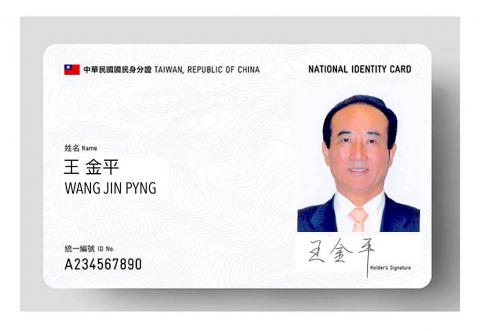The government in October next year is expected to launch electronic identification cards (eID) that combine the functions of existing national ID cards and Citizen Digital Certificates, which people use to file their taxes online, the Ministry of the Interior said yesterday.
The ministry is to complete the initial plan for issuing the cards in July and would share a more detailed plan, including the card’s design, in September, Minister of the Interior Hsu Kuo-yung (徐國勇) said.
The cards would integrate information from National Health Insurance cards and driver’s licenses, once cardholders activate the features, Hsu added.

Screen grab from Chinese Nationalist Party (KMT) Legislator Wang Jin-pyng’s Facebook page
The budget for establishing digital infrastructure and foundation services could require NT$4 billion (US$128.35 million), pending the Cabinet’s approval, the ministry said in a report submitted to the Legislative Yuan on Wednesday.
The new cards would be physical and virtual proof of identification; would allow digital signatures, privacy protection, autonomy of information disclosure; help with the transition to a “smart” government; have anti-counterfeit facilities; and would boost innovative applications and industry development, the report said.
Turning to security and privacy issues, the ministry said the cards could be used as proof of identity rather than as a device to store personal data, and therefore would not encroach on personal privacy.
The eID would contain less personal data than the current version, would be harder to counterfeit and would be equipped with the top-of-the-range identification technology to prevent information theft, the report said.
Cardholders would be able to access databases from various government agencies and public institutions, such as the National Health Insurance Administration.
The cards would also show cardholders’ marital status simply as “married” or “single,” but the name of their spouse would be stored on the card’s chip, a ministry official said at a legislative hearing yesterday.

An essay competition jointly organized by a local writing society and a publisher affiliated with the Chinese Communist Party (CCP) might have contravened the Act Governing Relations Between the People of the Taiwan Area and the Mainland Area (臺灣地區與大陸地區人民關係條例), the Mainland Affairs Council (MAC) said on Thursday. “In this case, the partner organization is clearly an agency under the CCP’s Fujian Provincial Committee,” MAC Deputy Minister and spokesperson Liang Wen-chieh (梁文傑) said at a news briefing in Taipei. “It also involves bringing Taiwanese students to China with all-expenses-paid arrangements to attend award ceremonies and camps,” Liang said. Those two “characteristics” are typically sufficient

A magnitude 5.9 earthquake that struck about 33km off the coast of Hualien City was the "main shock" in a series of quakes in the area, with aftershocks expected over the next three days, the Central Weather Administration (CWA) said yesterday. Prior to the magnitude 5.9 quake shaking most of Taiwan at 6:53pm yesterday, six other earthquakes stronger than a magnitude of 4, starting with a magnitude 5.5 quake at 6:09pm, occurred in the area. CWA Seismological Center Director Wu Chien-fu (吳健富) confirmed that the quakes were all part of the same series and that the magnitude 5.5 temblor was

The brilliant blue waters, thick foliage and bucolic atmosphere on this seemingly idyllic archipelago deep in the Pacific Ocean belie the key role it now plays in a titanic geopolitical struggle. Palau is again on the front line as China, and the US and its allies prepare their forces in an intensifying contest for control over the Asia-Pacific region. The democratic nation of just 17,000 people hosts US-controlled airstrips and soon-to-be-completed radar installations that the US military describes as “critical” to monitoring vast swathes of water and airspace. It is also a key piece of the second island chain, a string of

The Central Weather Administration has issued a heat alert for southeastern Taiwan, warning of temperatures as high as 36°C today, while alerting some coastal areas of strong winds later in the day. Kaohsiung’s Neimen District (內門) and Pingtung County’s Neipu Township (內埔) are under an orange heat alert, which warns of temperatures as high as 36°C for three consecutive days, the CWA said, citing southwest winds. The heat would also extend to Tainan’s Nansi (楠西) and Yujing (玉井) districts, as well as Pingtung’s Gaoshu (高樹), Yanpu (鹽埔) and Majia (瑪家) townships, it said, forecasting highs of up to 36°C in those areas